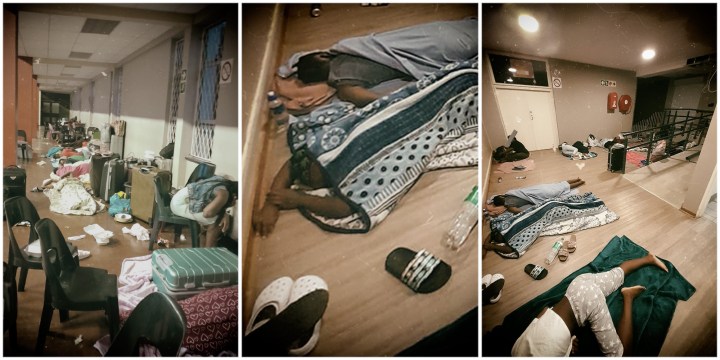CAMPUS STRIFE
Student protests over lack of housing spread to University of KwaZulu-Natal

A shortage of university accommodation at UKZN has left students sleeping in corridors, classrooms and hallways. This comes as students in Cape Town protest against housing and financial issues.
The University of KwaZulu-Natal (UKZN) is struggling to accommodate students at the beginning of the 2023 academic year.
On 21 February, photos began circulating on social media of unhoused students being forced to sleep in university corridors, hallways and even classrooms. TimesLIVE also reported that many students have been unable to register or enrol because of unpaid fees.
Protests erupted last week, with UKZN noting in a statement released on 23 February that “incidents that appear to be aimed at disrupting normal operations at some campuses”.
KZN EFF student command’s Inamandla Mabunda told Daily Maverick that students had been battling with housing for two weeks.
Mabunda said many students needing residence placements came from disadvantaged backgrounds and that their need for housing was urgent.
WATCH: The University of KwaZulu-Natal (UKZN) students leadership have threatened to shutdown the institution until all students are allocated residents as many are forced to spend nights in halls, corridors, and classrooms. @TimesLIVE pic.twitter.com/fQzep6KoR9
— Sakhiseni Nxumalo (@SakhiNxumalo) February 22, 2023
“At the current juncture, they are failing dismally,” Mabunda said of the university’s handling of the issue.
Protests broke out on UKZN’s Pietermaritzburg campus and the Edgewood campus in Durban where police and students clashed, resulting in the arrest of two students for public violence, eNCA reported.
UKZN spokesperson Normah Zondo said in a media statement that the university was doing its best to resolve the issues:
“The University of KwaZulu-Natal is firmly committed to ensuring that all students have access to safe and adequate accommodation. However, the University’s approved allocation of 19,550 beds for the 2023 academic year versus… enrolments means that it is not possible to provide accommodation for every registered student in the University’s own residences.
“Our staff are working tirelessly to ensure that all eligible students are registered for and allocated accommodation.”
Visit Daily Maverick’s home page for more news, analysis and investigations
On registration issues, the university noted that many students were calling for the registration period to be extended. To address this, UKZN chose not to implement a blanket extension for registration, but rather extend registration for certain sections of the student population. For instance, it was announced that postgraduate registration would be extended until 10 March, while selected undergraduate programmes would consider extended registration for returning students and first-time entry students. Once students from these select programmes qualified for late registration, they would also be eligible for financial clearance.
Accommodation ‘at capacity’
The university was unable to provide exact figures for how many students still needed accommodation, but on 27 February UKZN announced that university-owned accommodation was at capacity.
“Students who still require accommodation are being referred to private accommodation service providers who are registered with the Department of Student Residence Affairs’ private accommodation office in their respective campuses,” the university said.
The university said it planned to vet private accommodation to ensure it was up to standard.
Meanwhile, other universities are struggling to assist students after the National Student Financial Aid Scheme (NSFAS) capped accommodation allowances at R45,000 this year, an amount deemed by many to be too low due to the high costs of living and housing.
UCT’s rocky start
The University of Cape Town (UCT) was also off to a rocky start – its students’ representative council (SRC) called for a campus shutdown on 13 February. The shutdown was aimed at protesting against financial and housing issues.
On 17 February, UCT announced that it had approached the Western Cape High Court for an interim interdict “in order to restore order on campus and protect the rights of all in our UCT community”.
The university continued to hold talks with the SRC, but no resolution has been reached.
On 25 February, the SRC issued a statement saying:
“Following the SRC’s presentation, Council made the decision to reconvene soonest when the University Executive returns with the readiness to tackle this issue, which they unfortunately did not enter this meeting with…
“It is disappointing to, once again, be placed on the back foot by the University because of their own lack of preparedness… the SRC is engaging with the University Executive to find a resolution.
“We desperately hope that the University Executive will respond appropriately and swiftly to our request and that the best interests of the students will be met.” DM



















 Become an Insider
Become an Insider
Comments - Please login in order to comment.